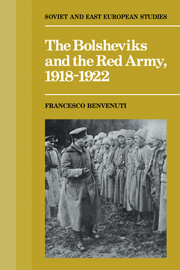Book contents
8 - Continuing political tensions
Published online by Cambridge University Press: 03 October 2009
Summary
The ‘single military doctrine’
It became clear at the 10th Congress that the most important military decisions would in future be overwhelmingly pragmatic, having little to do with matters of ‘principle’. The military question, which during the first two years of Soviet rule had played a prominent role in party debate, was no longer one of the ‘great political issues’. In spite of this, at the end of the 1921 the Republic's top military leaders became engaged in a lively controversy, centring on the tenets of the ‘single military doctrine’. On one side were ranged some of the most illustrious Bolshevik commanders of the Civil War period; and, on the other, Trotskii, at times isolated and at times given the embarrassing support of non-Bolshevik orthodox military theorists. Trotskii doubtless went too far when he suggested that his adversaries represented a resurgence of the ‘military opposition’ of 1919. Yet it could not be denied that men such as Minin and Voroshilov led the support for Gusev, Frunze, and Tukhachevskii.
The topics of debate had changed since the 8th Party Congress. At that time, issues had been raised that reached far beyond the military sphere. Attention had been focussed on the principal planks of party policy, and the foundations on which the Soviet state and the RKP(b), as the party of government, were being constructed, had been submitted to scrutiny. Arguably, at the 8th Congress, any specifically military ‘culture’ or military grouping was still at the embryonic stage among Bolsheviks. And it was perhaps precisely because military affairs were so loosely distinguished from others that this topic aroused such broad and varied interest among party members.
- Type
- Chapter
- Information
- The Bolsheviks and the Red Army 1918–1921 , pp. 195 - 218Publisher: Cambridge University PressPrint publication year: 1988

